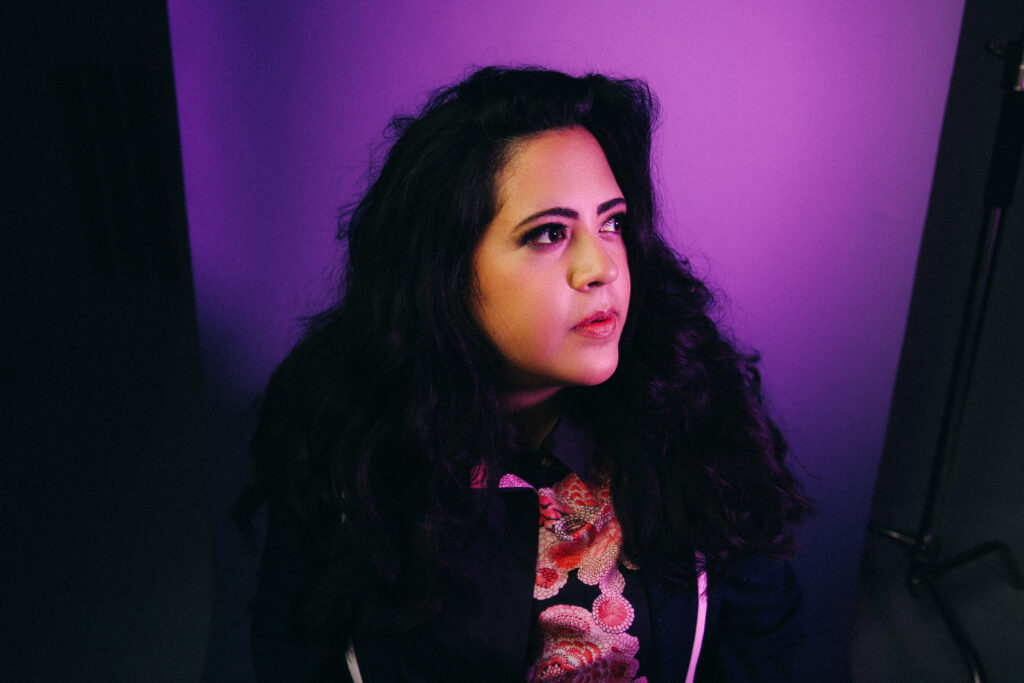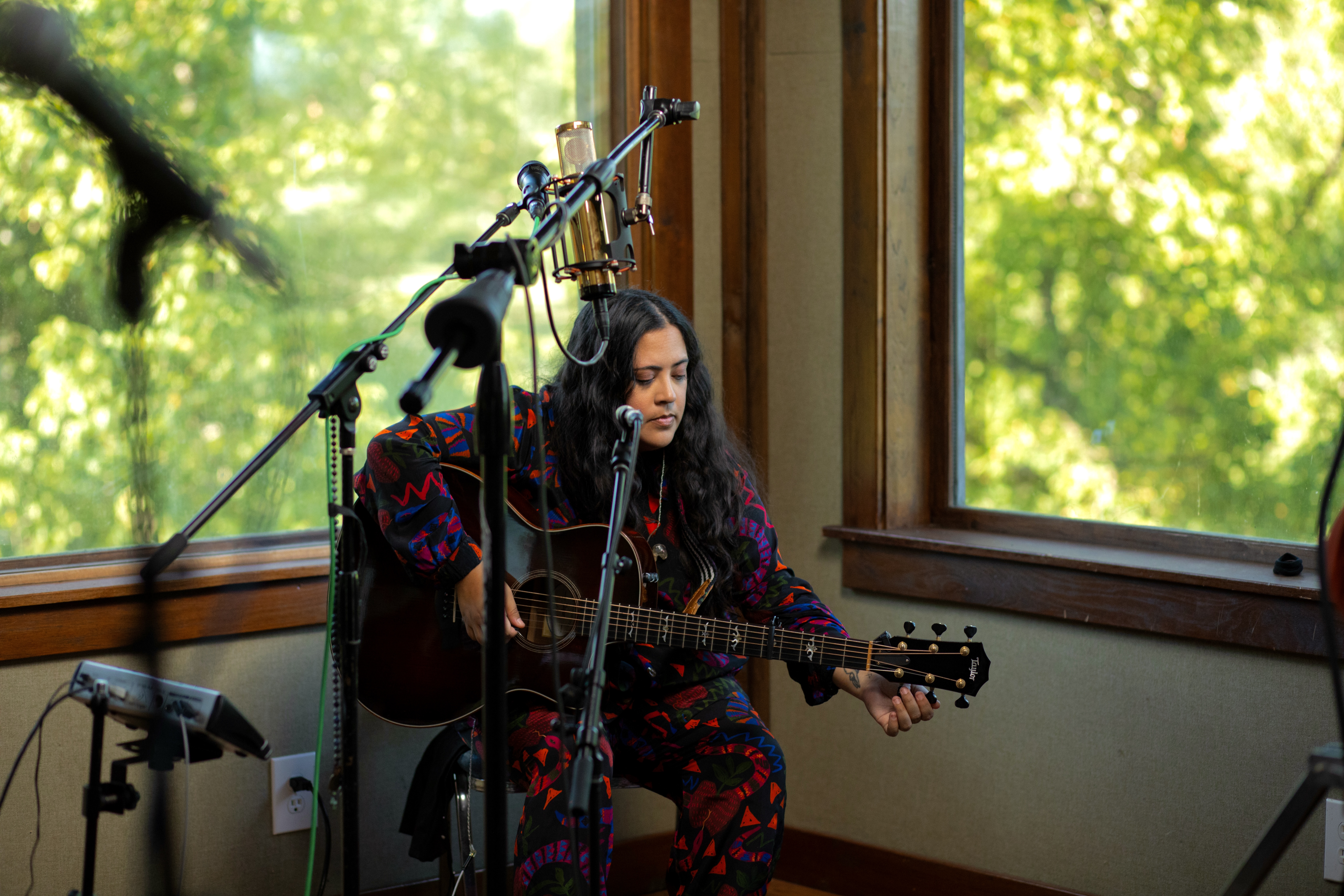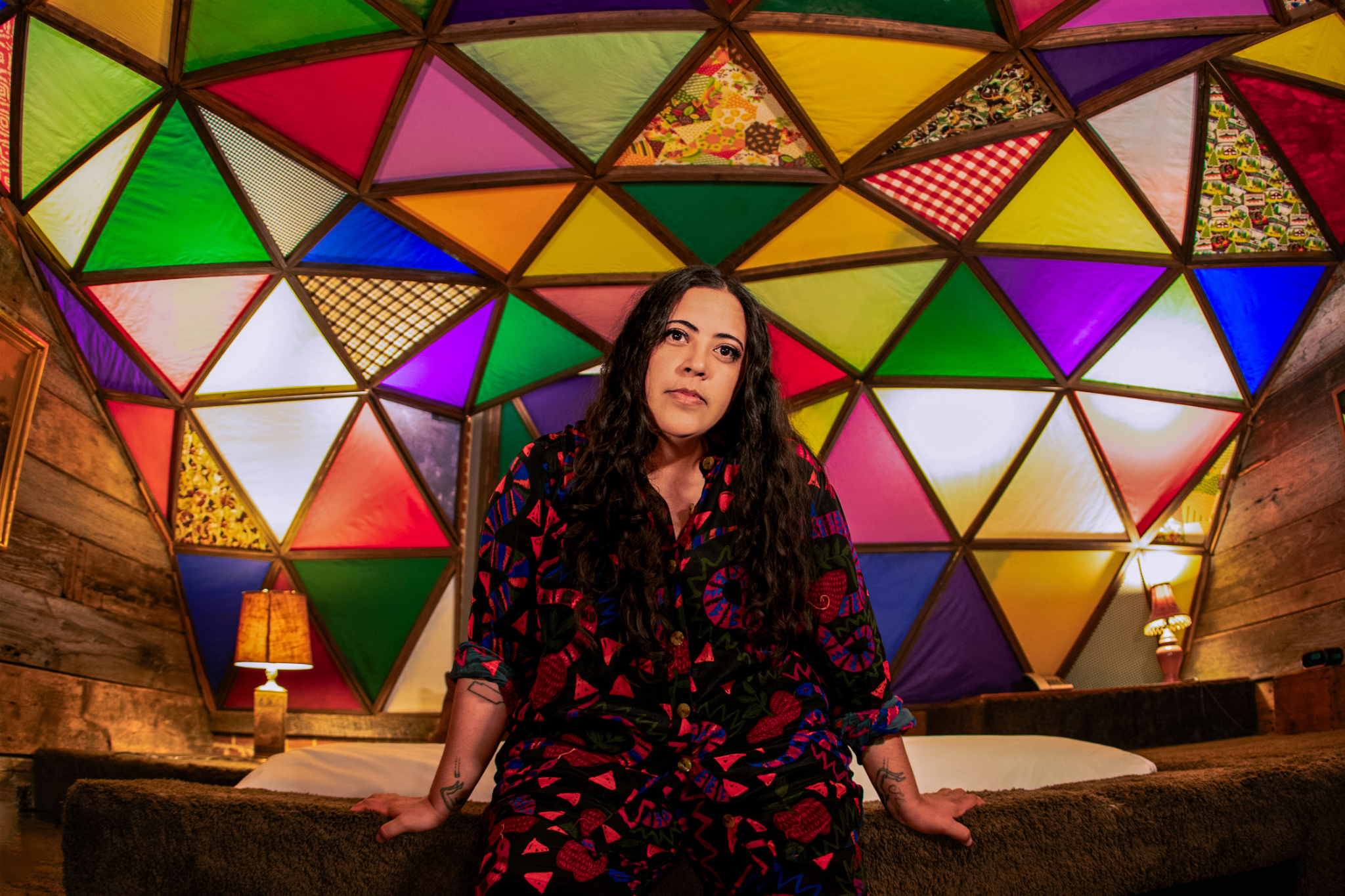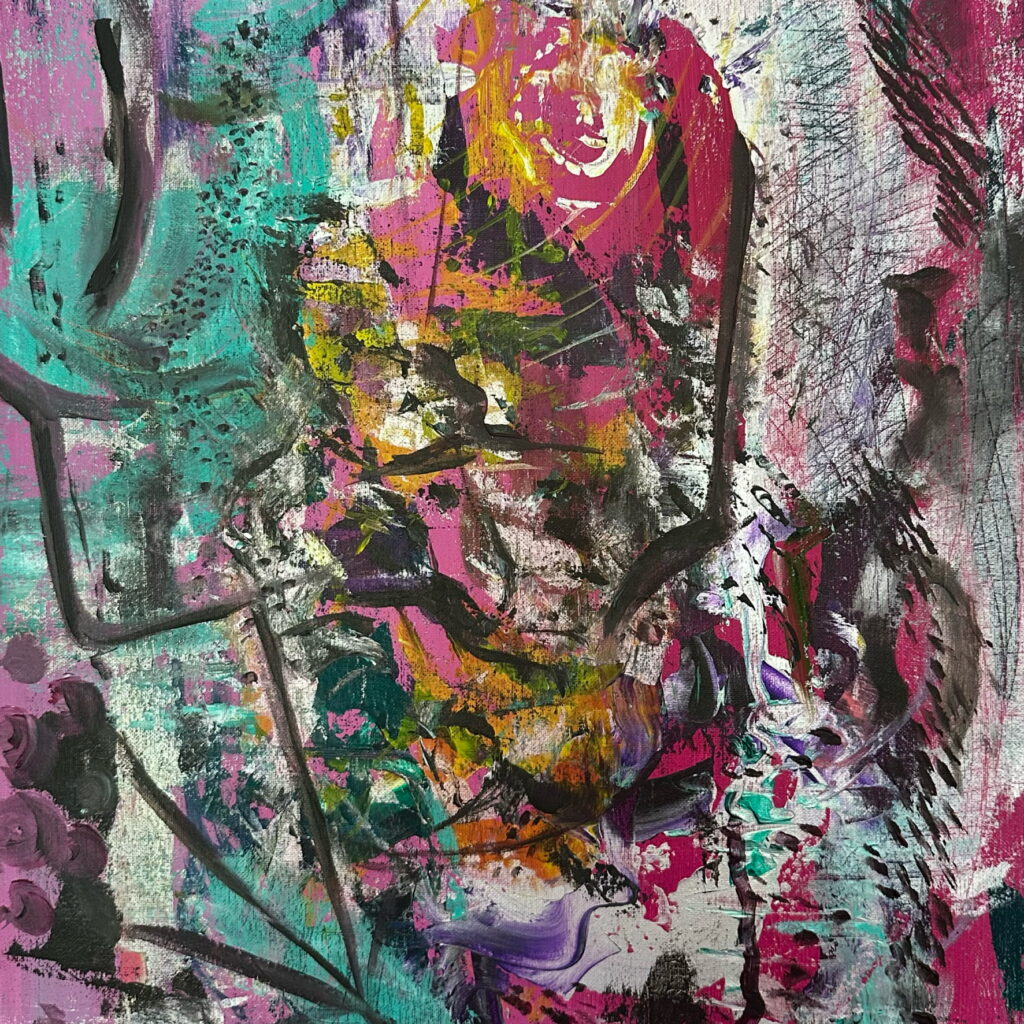Kristen Castro has always lived in the in-between. As a queer, Mexican American artist raised between Southern California’s coastal calm and Nashville’s songwriting heartland, her music has carried the push and pull of identity, heritage, and artistry since she first picked up a guitar at ten years old. For years she poured her voice and musicianship into the folk trio Maybe April, sharing stages with icons like Bonnie Raitt, Kris Kristofferson, and Gavin DeGraw. She toured the country, learned what it meant to survive on the road, and felt the electricity of being part of something bigger than herself. But when the spotlight shifted and Castro found herself alone with a decade’s worth of doubts, heartbreak, and transformation, she realized her next chapter would have to be one she wrote entirely on her own terms.
The result is Capricorn Baby, Castro’s self-produced, self-mixed, and deeply personal debut album. Released in August 2025, the nine-track project is both a personal diary and a widescreen soundscape, shimmering with indie pop melodies, steeped in folk intimacy, and textured with electronic atmospheres. It is a record about survival, about healing, about the alchemy of turning shadows into iridescent light. Listening through its progression feels like watching the weather clear after a storm: grey skies breaking open, the sun scattering color across the clouds, and a sense of fragile hope settling in.
“As hopeful as the record sounds, the earth and bed of the songs come from a deep sadness,” Castro says. “When I listen back, it feels like I am connecting with my past self, so broken and so lost, who used music as a flashlight out of the darkness. Every time I reach the final track, “Capricorn Baby,” it feels like that moment just after a storm: the sun peeking through, painting pearlescent colors across the clouds.”

That final track, a collaboration with Deb Talan of The Weepies, acts like a closing incantation. It ties together the album’s narrative arc with both intimacy and grandeur, a gesture that mirrors the project’s balance between whisper and roar. For Castro, these dynamics were never arbitrary. “I decide by listening to the sorrow inside the song,” she explains. “The lyric always leads me. Sometimes it asks to be cradled in tenderness and other times it begs to be set free in a roar.” It is an instinct that keeps her songs hovering between fragility and catharsis, never fully choosing one or the other, much like life itself.
Part of the album’s power comes from the fact that Castro built it alone, refusing to let anyone else dilute its vision. Writing, producing, and mixing the project herself gave her both absolute control and unbearable responsibility. At times, she admits, she nearly gave up. “I now understand the carefulness and frustration sculptors feel when carving a masterpiece from stone. I wanted to abandon this project more times than I can count. At a certain point, Capricorn Baby wouldn’t have existed if I hadn’t mixed it myself. That process was as challenging as it was joyful. No part was left behind because every note served a purpose in its moment. Mixing became a way of honoring every leaf on the tree.”
It is not only the craftsmanship but also the thematic consistency that makes Capricorn Baby feel larger than the sum of its parts. The songs unfold like letters written to an earlier self, shaped by unrequited love, self-rediscovery, and the constant negotiation of identity. Castro calls it “a celebration of learning to trust myself creatively, personally, and spiritually.” The guiding thread, she says, was “unrequited love and the rediscovery of self-worth.” From the cosmic shimmer of “Tarot” to the stripped-down vulnerability of “Amor & Psyche,” she allows her listeners into a sonic world that is as messy as it is luminous.
That messiness is intentional. For Castro, complexity is what makes the heart beat faster. “When energetic guitars intertwine with melancholic lyrics and synthesizers that feel like stars, the sound becomes expansive like life itself. Life is messy and complicated, but it can also be beautiful and rewarding in reflection. I wanted the album to reflect everything I feel when I’m deeply entangled in a soul connection with someone, and how I learn to love myself through those moments.”

Her reflections on self-love and survival are inseparable from her Latinx and queer identity. In an indie pop world where representation is often fragmented, Castro occupies a rare space. “I don’t think these perspectives are represented enough, and as an artist, it often feels like I’m swimming upstream,” she admits. “Most of the queer pop artists I love are predominantly white, and most Latinx artists sing in Spanish. There are very few brown, LGBTQ-identifying musicians in the indie, English-speaking space, and sometimes it feels like I don’t fully belong in either world. I’m grateful for my differences, but I also wish the indie pop landscape offered more intersectional representation.”
That tension—between gratitude and longing, belonging and alienation—echoes across Capricorn Baby. It informs both the hushed confessions and the soaring anthems, as if Castro is constantly navigating the space between worlds, refusing to reduce herself to one side of the spectrum. The title itself holds that same duality: playful yet serious, childlike yet rooted in astrology’s reputation for structure and discipline. “The title felt right because it holds both vulnerability and playfulness, but also a certain seriousness, all sides of myself,” she says. “It’s about honoring who I am right now while also celebrating my inner child, the version of me who always thought she was cool. The project is rooted in my dedication to healing, which feels very Capricornistic, and the ‘baby’ adds this softness and romance. It’s like saying, ‘Hey, this is me, I’m a weirdo, I love the stars, and I finally love myself too.’”
For Castro, healing is not just thematic—it is the engine that drives her creativity. She describes music-making as a ritual, a form of therapy. “Creating music is my highest form of healing; it’s my therapy. I usually write when my emotions are overflowing, and in that process, the production becomes a mirror of me transforming those shadows into light. It feels like alchemy, turning my inner darkness into these iridescent melodies that carry both the weight and the release.”
That sense of alchemy explains the cinematic sweep of her music, which often feels visual in its emotional breadth. Castro credits Míla Fürstová’s artwork for Coldplay’s Ghost Stories as a key inspiration, particularly its dreamlike, celestial palette. “It felt dreamy, nostalgic, somber, and existential, and the songs themselves reflect how that art made me feel,” she says. It is easy to hear that influence in Capricorn Baby, which feels painted rather than constructed, a canvas of light and shadow where lyrics and synths blur into something like memory itself.

Looking back at her years with Maybe April, Castro recognizes how much those experiences prepared her to step into this new role. She remembers being told by Kris Kristofferson backstage during GRAMMY week to “Don’t ever quit,” a mantra that became crucial in the long and often isolating process of finishing her debut. “As prestigious and groundbreaking as these artists are, the biggest takeaway was that we’re all just humans trying to figure this life out—and that if you honor music from the heart, you can end up in the wildest places you never imagined.” Capricorn Baby, then, is her way of honoring that same freedom: a refusal to quit, a promise to keep breaking, feeling, and dreaming.
For an album that feels so expansive, it is striking how much of its intimacy is anchored in small choices: the way a lyric whispers before it blooms into fire, the way an acoustic guitar grounds an otherwise shimmering soundscape, the way her voice never lets go of its vulnerability even when the production swells. The tracklist, which flows from the dreamy opener “Amsterdam” to the luminous finale with Deb Talan, mirrors the cyclical journey of heartbreak and healing. It is an album that aches but never collapses, that wanders but always finds its way home.
Castro sees that journey as ongoing. Now that the album is out, she is less interested in critical consensus than in the conversations it sparks. “I hope Capricorn Baby reminds people that our shadows are worth listening to, that healing isn’t linear, but every feeling carries its own melody if you let it move through you. For the industry, I hope it proves that music doesn’t have to be perfect to be powerful. Creating from the soul isn’t about money or fame, it’s about honoring truth. I almost backed away from Capricorn Baby, over ten times this year, but I held my ground, letting my truth take flight, soaring and singing into the world.”
At its core, Capricorn Baby is not only the story of an album, but of an artist who chose to embrace her own contradictions, to turn silence into sound and sorrow into iridescence. It is the work of someone who refused to quit, who honored every leaf on the tree, who carved beauty out of struggle. In its whispers and its roars, its shadows and its light, the album becomes both diary and beacon, a testament to transformation that resonates far beyond the self who created it.
Featured Images: Artist Supplied



